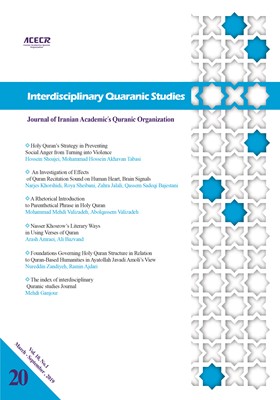Nasser Khosrow’s Literary Ways in Using Verses of Quran
Subject Areas :arash amraie 1 , ali bazvand 2
1 -
2 -
Keywords: Nasser Khosrow Ways of Reflection Influence of Quran Verses ,
Abstract :
As the Holy Quran is an infinite source of ethical, human and educational thoughts and teachings, many Persian language poets and writers have benefited from this treasury. This mingling of the Persian written heritage with Islamic teachings has made it difficult to understand the heritage without being familiar with the Quran and Hadiths. Nasser ibn Khosrow Qobadiani is among the poets who have put their poetry at the service of promoting their religious and sectarian beliefs. In order to gain this objective and fulfilling the religious mission of his poetry, he has embellished his poems with the glowing verses. Given the religious background of Nasser Khosrow, his poems involve ethical guidelines and many pieces of advice. Having good mastery over Quranic concepts, he has adorned his poems with the holy verses, most skillfully and with the best method benefiting from full verses or part of them and sometimes using their concepts and meaning. This has certainly enhanced the effect of his messages. This paper uses examines the Divan of Nasser Khosrow and, using statistical tables, analyzes different types of reflection of the Quran’s verses in his poems. It will also be shown that Nasser Khosrow’s main reasons for using verses of the Quran include his mental and language association with the Holy Book and his efforts to explain his objectives and thought using the influence and status of the Quran among Muslims. This way, he directs the reader’s attention to the need to accept his ideas because they actually originate from the Quran and are somehow a poetic expression of the concepts.
قرآن کریم (1386). ترجمه الهی قمشهای. قم: دانش.
حلبی ، علی اصغر (1393). تأثیر قرآن و حدیث در ادب فارسی. تهران : اساطیر .
رادمنش، سیدمحمد (1380). تصویرهای قرآنی در آثار منظوم جامی . فصلنامه دانشکده ادبیات و علوم انسانی دانشگاه تهران، 2(2)، 71- 82 .
راستگو، سيدمحمد (۱۳۷۴).تجلي قرآن و حديث در شعر فارسي. تهران: سمت.
روحانی، رضا (۱۳۸۱). قرآن و تاویل آن از دیدگاه ناصرخسرو. فصلنامه الهیات و معارف اسلامی(مطالعات اسلامی)، ۵۸ ، 57-93.
سبزيان پور، وحيد (۱۳۸۳). مطالعه مورد پژوهانه در تاثير قرآن در ادبيات فارسي . پژوهشهاي قرآني، ۷۵ (۱) ، 95- 120 . صفا، ذبیح الله (۱۳۸۸).تاریخ ادبیات در ایران، تهران: انتشارات فردوس.
قبادیانی بلخی، ناصربن خسرو (۱۳۸۷). دیوان اشعار(تصحیح: مجتبی مینوی و مهدی محقق). تهران: انتشارات دانشگاه تهران. قربانی زرین ، باقر (1383). جایگاه قرآن و حدیث در شعر فارسی سده سوم و چهارم هجری . مجله سفینه ، 3 ، 32-47 .
محقق، مهدی (۱۳۷۴). تحلیل اشعار ناصرخسرو. تهران: انتشارات دانشگاه تهران.
محقق، مهدی (۱۳۸۲). تعلیقات بر دیوان ناصرخسرو. نامهی پارسی، ۲۹، 221-241 .
مدرس زاده، عبدالرضا (۱۳۸۶). واژگان خاص در شعر ناصرخسرو. زبان و ادبیات فارسی(دانشگاه آزاد اسلامی اراک)، ۱۲، 135-152 .
موسوی، سیده زهرا و ذوالفقاری، محسن (۱۳۸۴). نقد شیوههای تأثیرپذیری در شعر ناصرخسرو. زیبایی شناسی ادبی ، 3 ، 57-77 . نوریان، مهدی (۱۳۸۲). برخی دشواریهای متن دیوان ناصرخسرو. نامهی پارسی، ۲۹، 279- 87 .
هانسبرگر، آلیس سی (۱۳۸۰). ناصرخسرو لعل بدخشان (مترجم: فریدون بدرهای). تهران: فرزان.
یوسفی، محمد رضا (۱۳۸۷). چگونگی ورود قرآن و حدیث به شعر فارسی. پژوهش نامه قرآن و حدیث، 5، 97-116.


